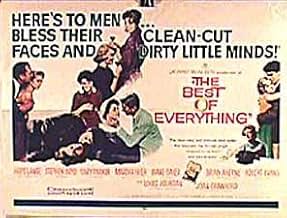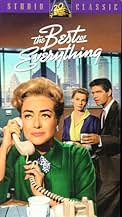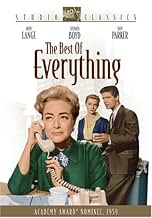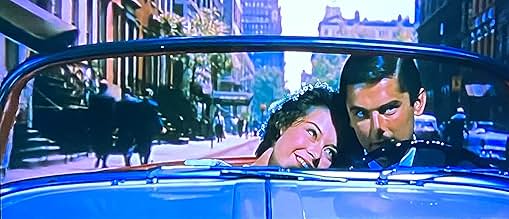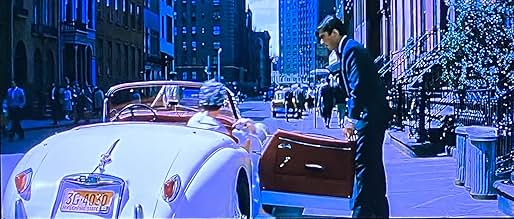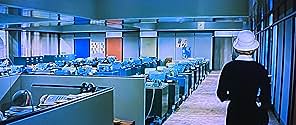IMDb RATING
6.6/10
2.5K
YOUR RATING
An expose of the lives and loves of Madison Avenue working girls and their higher ups.An expose of the lives and loves of Madison Avenue working girls and their higher ups.An expose of the lives and loves of Madison Avenue working girls and their higher ups.
- Nominated for 2 Oscars
- 2 nominations total
Linda Hutchins
- Jane
- (as Linda Hutchings)
Ted Otis Sr.
- Dr. Ronnie Wood
- (as Ted Otis)
Gertrude Astor
- Leading Woman in Play
- (uncredited)
Alan Austin
- Bill
- (uncredited)
Joseph Bardo
- Policeman
- (uncredited)
Featured reviews
The Best of Everything is a high gloss large screen soap opera which follows the careers of four career women, Hope Lange, Suzy Parker, Diane Baker, and Martha Hyer at a New York publishing firm. What's the best for some women is not necessarily the best for all.
Presiding over this group of young fillies is wise old mare Joan Crawford who's been around the track a few times on screen and in real life. She looks right at home as the boss lady as well she should have at this point.
Around the time she was making The Best of Everything Joan Crawford became a widow when her fourth husband, Alfred Steele died. It was a particularly traumatic event for her, she woke up one morning and found him dead in bed next to her. She inherited all of his stock in Pepsi Cola where he was the board chairman and during the same period as The Best of Everything was being made, she wound up the queen bee at Pepsi Cola. Life does sometimes imitate art. So that authority as she barks out dictation and coffee orders to Hope Lange rings real true.
In fact all the women here with the exception of Lange are in for some rough sledding. It's rough for Lange too, but she literally makes the best of everything.
What a collection of stinkers the men are in this film. The best of them, Stephen Boyd, is a heavy drinker. The others Louis Jourdan, Robert Evans, and Brett Halsey, are as slimy a collection of rodents as ever gathered for one film.
I can't forget Brian Aherne either who's the fanny pinching head of this publishing firm. Half that office would have sexual harassment suits going today.
Some nice location shots of New York in the fifties make the film a real treat. Catch it by all means.
Presiding over this group of young fillies is wise old mare Joan Crawford who's been around the track a few times on screen and in real life. She looks right at home as the boss lady as well she should have at this point.
Around the time she was making The Best of Everything Joan Crawford became a widow when her fourth husband, Alfred Steele died. It was a particularly traumatic event for her, she woke up one morning and found him dead in bed next to her. She inherited all of his stock in Pepsi Cola where he was the board chairman and during the same period as The Best of Everything was being made, she wound up the queen bee at Pepsi Cola. Life does sometimes imitate art. So that authority as she barks out dictation and coffee orders to Hope Lange rings real true.
In fact all the women here with the exception of Lange are in for some rough sledding. It's rough for Lange too, but she literally makes the best of everything.
What a collection of stinkers the men are in this film. The best of them, Stephen Boyd, is a heavy drinker. The others Louis Jourdan, Robert Evans, and Brett Halsey, are as slimy a collection of rodents as ever gathered for one film.
I can't forget Brian Aherne either who's the fanny pinching head of this publishing firm. Half that office would have sexual harassment suits going today.
Some nice location shots of New York in the fifties make the film a real treat. Catch it by all means.
Caroline Bender (Hope Lange) is just killing time getting a job. Her real ambition is to marry Eddie and have a baby.
April (Diane Baker) is too innocent to stay that way for long and falls in love too easily, a dangerous combo.
Greg (Suzy Parker) is a go-getter and wants to be an actress.
All three are doomed for dramatics in 'The Best of Everything', a 1959 soap opera/morality play/sometimes solid movie that is aging by the second.
Set in the cut-throat world of paperback publishing, its not as trashy as "Valley of the Dolls" but not as vanilla as "Three Coins in the Fountain."
The men in the mix - Brian Aherne, Stephen Boyd, Louis Jourdan and Robert Evans - are slick, well-dressed and no good, for the most part. Aherne is the resident sexual offender - will pinch anything walking by, and makes unwanted advances right and left. His character is offensive as hell, but its not played seriously at all. Harassment hadn't been discovered yet, I guess. Boyd works there, too, although you never see him actually doing anything. He's too busy being older, wiser and drunker. Evans is abroad just so Diane Baker can suffer in style - he's a rich kid who's gotten her in 'trouble' so instead of marrying her, as promised, he's taking her to get an 'operation.'
Jourdan is a director who mistakenly has an affair with Parker. They share a fight scene which is fairly no-holds barred, in a movie like this anyway, but the scene is ultimately ruined by Parker's histronics. She ends up nearly stalking him, and she really didn't deserve such a lousy fate, her bad acting notwithstanding.
Joan Crawford breathes fire as Amanda Farrow, the resident 'witch' who is automatically rude and dismissive of any of her legion of secretaries. Well they are younger, aren't they? Isn't that sufficient reason to hate a person? Caroline doesn't think so, as she admirably stands up to Miss Farrow every chance she gets. Crawford only gets to let loose once, when she tells her married boyfriend 'you can your rabbit-faced wife can both go to hell' and slams down the phone. You never get to see the poor soul who dare crosses her.
Martha Hyer's 'storyline', as it were, is extremely weak, and she is painfully over-the-top as an unmarried mother. Short of wearing a huge "W" (for 'whore') on her cardigan, she walks around like a pathetic mess for most of her screen time. Even worse, she is not given the courtesy of having it all 'tied up', one way or the other, at the end. It won't matter that much, but still..
Its painfully obvious this all took place in a totally different world. People were nicer to one another for the most part and work was not a drag but something exciting, for a girl from outside NYC anyway.
One unconvincing drunk scene aside, Hope Lange helps it seem reasonably real as Caroline, who at least has more than one side to her character.
I admire that women are seen having an opinion, a chance and a choice. Not that its not wrapped in a nice bow, but it makes some points for equality. In 1959 that was probably noteworthy and possibly controversial. 7/10.
April (Diane Baker) is too innocent to stay that way for long and falls in love too easily, a dangerous combo.
Greg (Suzy Parker) is a go-getter and wants to be an actress.
All three are doomed for dramatics in 'The Best of Everything', a 1959 soap opera/morality play/sometimes solid movie that is aging by the second.
Set in the cut-throat world of paperback publishing, its not as trashy as "Valley of the Dolls" but not as vanilla as "Three Coins in the Fountain."
The men in the mix - Brian Aherne, Stephen Boyd, Louis Jourdan and Robert Evans - are slick, well-dressed and no good, for the most part. Aherne is the resident sexual offender - will pinch anything walking by, and makes unwanted advances right and left. His character is offensive as hell, but its not played seriously at all. Harassment hadn't been discovered yet, I guess. Boyd works there, too, although you never see him actually doing anything. He's too busy being older, wiser and drunker. Evans is abroad just so Diane Baker can suffer in style - he's a rich kid who's gotten her in 'trouble' so instead of marrying her, as promised, he's taking her to get an 'operation.'
Jourdan is a director who mistakenly has an affair with Parker. They share a fight scene which is fairly no-holds barred, in a movie like this anyway, but the scene is ultimately ruined by Parker's histronics. She ends up nearly stalking him, and she really didn't deserve such a lousy fate, her bad acting notwithstanding.
Joan Crawford breathes fire as Amanda Farrow, the resident 'witch' who is automatically rude and dismissive of any of her legion of secretaries. Well they are younger, aren't they? Isn't that sufficient reason to hate a person? Caroline doesn't think so, as she admirably stands up to Miss Farrow every chance she gets. Crawford only gets to let loose once, when she tells her married boyfriend 'you can your rabbit-faced wife can both go to hell' and slams down the phone. You never get to see the poor soul who dare crosses her.
Martha Hyer's 'storyline', as it were, is extremely weak, and she is painfully over-the-top as an unmarried mother. Short of wearing a huge "W" (for 'whore') on her cardigan, she walks around like a pathetic mess for most of her screen time. Even worse, she is not given the courtesy of having it all 'tied up', one way or the other, at the end. It won't matter that much, but still..
Its painfully obvious this all took place in a totally different world. People were nicer to one another for the most part and work was not a drag but something exciting, for a girl from outside NYC anyway.
One unconvincing drunk scene aside, Hope Lange helps it seem reasonably real as Caroline, who at least has more than one side to her character.
I admire that women are seen having an opinion, a chance and a choice. Not that its not wrapped in a nice bow, but it makes some points for equality. In 1959 that was probably noteworthy and possibly controversial. 7/10.
I am still trying to figure out why I like this film (and so many like it), when in truth, the submissiveness of females and their dependence on the love of a man really sickens me. The depiction of women in this film is perhaps a bit more progressive than that in other films of this genre, as the women are, at least, career women, and much of the story is set in the office. However, among the three key friends (Hope Lange, Suzy Parker, and Diane Baker), Lange's character Caroline Bender is the only one determined to be an editor. However, at the same time, when her colleague Mike Rice (Stephen Boyd) asks her if she has any ambitions beyond working a year or so, she quite adamantly says "no..none at all"...so, it's a bit contradictory, and frustrating. And he, of course, says it's "wonderful" when she agrees with him that it would be quite satisfying for her to "get her feet wet in publishing for a year or two to prove what she has "to prove", marry a doctor or lawyer, and have babies".
Some of the dialog is beyond hope, but I inexplicably continue to watch this film, every so often. Maybe it's the women's clothing...I love suits, and I miss dressing up for work. (Business casual has been one of several downfalls of today's workplace, as far as I'm concerned. Even though I'm a die-hard liberal, I definitely appreciate and enjoy conservative dress). No, but really...perhaps it is because I want to see if at least one of these women wakes up and takes stock in her own life, and throws back all of the crap that her "sweetheart" dishes out at her. Hope Lange does so to a degree when she rhetorically asks her slime-bucket hometown beau Eddie "what is it about men that they think they deserve the most refined, cultured, "respectable" women from the "best schools and the best families" only "part-time", for only fun, but ignore all of the attendant responsibilities that would turn frolic into long-term, serious relationships. She then goes on to say that a number of women will play the same game as men, for a while, but eventually, they'll have to pick up a few extra men of their own, to fill in the time when they're not with the one they really want. I guess she's talking about today's "casual dating" and "hooking up". Having spent some time lately with various dating services, I've run into more slime-buckets during the past year than I have in my entire life. Again, even though politically I'm quite liberal, my own social mores lean far more to those of a "Rules Girl". So, this piece of dialog resonated with me at this time in my life.
The opening credits are very nice...Manhattan in the spring/summertime is always glorious. Though I need to laugh that it's Johnny Mathis singing the title song, "The Best of Everything" (I've always thought that he was a very funny singer...he often breaks what should be long-held notes with silence...perhaps he's breathing, but we don't hear him inhale), it's also perfect....who else would be singing this song for a 1950's movie about finding your way in life and in love.
Joan Crawford's boss is in many ways no different from some of the tyrannical maniacs I've worked for today, no joke. Joan Crawford's Amanda Farrow was more or less a direct, no holds barred, right-in-your face bitch, telling Hope Lange that she does not have what it takes to become a Reader, much less an Editor. And, she did it in front of the rest of the typing pool (how unprofessional is that?). In the 80's, people stabbed you in the back. In the 90's, and to a degree, now, people smile at you directly, and let you believe all is well, until you're laid off in one surprising second.
I found it inconsistent how the Suzy Parker character started out as an independent, career-minded, aspiring actress, who prided herself on never having needed a man ("to love, and to let go...that's me"), but ended up becoming the most debilitated by the rejection of a man with whom she had fallen in love. And of course, it's also amazing how Diane Baker, fresh from being thrown out of a speeding car and losing a baby (out of wedlock, no less, in the 1950's!) manages to attract the attention and heart of a young, studly doctor when she's still wearing bandages and no make-up in her hospital bed. Wonders never cease in a 1950's melodrama!
If you hedonistically enjoy "Valley of the Dolls", or "Written on the Wind", you'll love "The Best of Everything".
Some of the dialog is beyond hope, but I inexplicably continue to watch this film, every so often. Maybe it's the women's clothing...I love suits, and I miss dressing up for work. (Business casual has been one of several downfalls of today's workplace, as far as I'm concerned. Even though I'm a die-hard liberal, I definitely appreciate and enjoy conservative dress). No, but really...perhaps it is because I want to see if at least one of these women wakes up and takes stock in her own life, and throws back all of the crap that her "sweetheart" dishes out at her. Hope Lange does so to a degree when she rhetorically asks her slime-bucket hometown beau Eddie "what is it about men that they think they deserve the most refined, cultured, "respectable" women from the "best schools and the best families" only "part-time", for only fun, but ignore all of the attendant responsibilities that would turn frolic into long-term, serious relationships. She then goes on to say that a number of women will play the same game as men, for a while, but eventually, they'll have to pick up a few extra men of their own, to fill in the time when they're not with the one they really want. I guess she's talking about today's "casual dating" and "hooking up". Having spent some time lately with various dating services, I've run into more slime-buckets during the past year than I have in my entire life. Again, even though politically I'm quite liberal, my own social mores lean far more to those of a "Rules Girl". So, this piece of dialog resonated with me at this time in my life.
The opening credits are very nice...Manhattan in the spring/summertime is always glorious. Though I need to laugh that it's Johnny Mathis singing the title song, "The Best of Everything" (I've always thought that he was a very funny singer...he often breaks what should be long-held notes with silence...perhaps he's breathing, but we don't hear him inhale), it's also perfect....who else would be singing this song for a 1950's movie about finding your way in life and in love.
Joan Crawford's boss is in many ways no different from some of the tyrannical maniacs I've worked for today, no joke. Joan Crawford's Amanda Farrow was more or less a direct, no holds barred, right-in-your face bitch, telling Hope Lange that she does not have what it takes to become a Reader, much less an Editor. And, she did it in front of the rest of the typing pool (how unprofessional is that?). In the 80's, people stabbed you in the back. In the 90's, and to a degree, now, people smile at you directly, and let you believe all is well, until you're laid off in one surprising second.
I found it inconsistent how the Suzy Parker character started out as an independent, career-minded, aspiring actress, who prided herself on never having needed a man ("to love, and to let go...that's me"), but ended up becoming the most debilitated by the rejection of a man with whom she had fallen in love. And of course, it's also amazing how Diane Baker, fresh from being thrown out of a speeding car and losing a baby (out of wedlock, no less, in the 1950's!) manages to attract the attention and heart of a young, studly doctor when she's still wearing bandages and no make-up in her hospital bed. Wonders never cease in a 1950's melodrama!
If you hedonistically enjoy "Valley of the Dolls", or "Written on the Wind", you'll love "The Best of Everything".
Meant to be a glossy romance and cautionary tale for girls who dare to think of working Outside The Home, "The Best of Everything" instead is a virtual primer of the root causes of the modern Women's movement: Women (really, girls) can have jobs, but only until they find a man and leave to begin their real lives as homemakers; women are sexual toys, provided to men at work for their amusement; all men are predators and all women are fools; pregnancy is entirely the woman's fault; women who take their jobs seriously are damaged people; women merely exist for the use of men. Sounds like an unremitting screed, and it is -- yet, such is Hollywood's power, the pageant is very watchable (the clothes, the sentimental views of 1959 NYC) and beautiful. A wonderful snapshot of America just a couple of years before "The Feminine Mystique" was published. Must-see for women.
More equality today, much more, but overall nothing has changed. All the sad, tawdry, pathetic, moving and bitter moments between women and men in the office is just as it is today, less the blatant sexual harassment. Love looking at old pics of nyc and looking in store windows....things seem surprisingly familiar and not dated.
Did you know
- TriviaJoan Crawford, recently elected to the board of directors of Pepsi after the death of her husband who had been President and CEO of the company, managed to swing a brief quasi product plug for the soft drink by having an unmistakable Pepsi machine (with the red, white, and blue Pepsi logo, but sans the word "Pepsi") installed in the secretaries' on-screen break room.
- GoofsIn the scene when Diane Baker tells Hope Lange "he's ten foot tall to me" while walking down the street, several people... two men and two young boys... look into the camera, smiling (they were obviously filming with a camera hidden in a car during these scenes as those people weren't extras).
- Quotes
Amanda Farrow: Now you and your rabbit-faced wife can both go to hell!
- ConnectionsFeatured in Playboy's Penthouse: Episode #1.1 (1959)
- SoundtracksThe Best of Everything
by Sammy Cahn and Alfred Newman
Johnny Mathis sings during the opening credits
Also sung by a chorus at the end
Played often in the score
- How long is The Best of Everything?Powered by Alexa
Details
Box office
- Budget
- $2,500,000 (estimated)
- Runtime2 hours 1 minute
- Color
- Aspect ratio
- 2.35 : 1
Contribute to this page
Suggest an edit or add missing content



